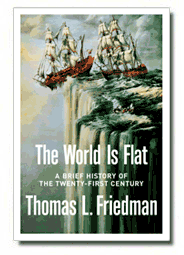Tuesday, June 22, 2010
Getting around on a flat world
This blog is based on the book, The World is Flat, written by Thomas L. Friedman. I’m going to write on his ideas and what it means for people like me; young college going students of India.
The first question I had when I came across this topic was pretty obvious. What does someone mean by, “The World is flat”. I still remember my first grade teacher showing us a globe. She wouldn’t have been bluffing, would she? So that’s how Mr. Friedman hooked me to read the book. I read it because the title made me curious.
The world is flat, as Friedman explains, because “Globalization today empowers, enables and enjoins individuals and small groups to go global so easily and seamlessly”. Thing about it! How many things can you do today, which only major corporations could do a decade or so ago? Building a website, sharing information through voice and text with millions, interacting and communicating across the world are some. You can do all this today because they are essentially free, thanks to the internet. The playing field has been leveled and the global world; flattened.
One of the few new effects of this is outsourcing. India has benefited tremendously from this courtesy the new jobs flowing in. It doesn’t end here. Remember I said in the previous paragraph how individuals are being empowered. This has led to dynamic new ideas and innovations being born and put into business. On both worlds, both new and old (America and Eurasia) individuals are cutting into the growing pie of the global economy.
Friedman’s book fails to mention a recession because it occurred much later. No matter. The recession is a bump, a speed breaker to check the progress we are so rapidly making. The zenith of IT for example was after the DOT COM bubble (more info) burst.
The point that is coming to a clear focus is this. In the new age, there will be two ways to succeed. A mass of people mostly in the developing nations will start doing the work the developed nations had assigned to their workforce. These people will start working for a better standard of life. The other way will be occupied by those in the developed economies,(or even quick growers in the developing sphere) who learn to be more than a professional. They would require being great adapters, explainers, collaborators, leveragers, passionate and good networkers. They will need to create new ideas and make them marketable or offer something that makes them indispensable to a global supply chain. They have the power to do this, thanks to the internet.
Right now no one is completely certain where the developed world is heading next. We are at the brink of a revolution in industry and business, akin to the industrial revolution. Remember all those workers who were left jobless when the machines came to work? That’s kind of where we are right now. The workers starved initially and then as they accepted the machines, they changed their skill set to become operators. In the economic boom that followed, new companies bought more machines, needed more workers and prosperity ensued.
This is what we should be heading for. A world where an individual will have the power to affect his economic destiny; through collaboration with others like him.
Labels:
business,
economy,
entrepreneurship,
Friedman,
India,
IT,
outsourcing,
the world is flat
Subscribe to:
Post Comments (Atom)





thanks maria. I am sorry for taking this long, but its university season :)
ReplyDelete